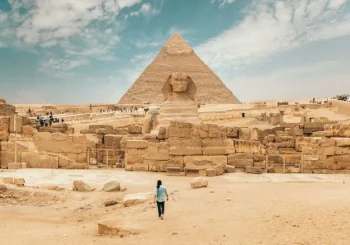The hip-hop scene seems to be most dominant in Egypt, with singers such as Marwan Moussa, Wegz, and other artists topping the Spotify wrapped status. However, long before these artists were in the picture – as far back as 12 years ago – the hip-hop scene was flourishing in other countries in the MENA region.
The emergence of Arab hip-hop is often linked with Palestine, as it was Palestinian artists who first adopted the Western beats to produce tracks centered around resistance against the Israeli occupation. When the Arab Spring erupted in 2010, spilling into 2011, the scene blossomed with local artists using their talents to produce revolutionary tracks, some of which went on to become anthems to local youths.
The pattern of Arab hip-hop artists using their music to rally people and speak to them about resistance efforts is still prevalent today.
Here is a list of seven hip-hop artists from the Middle East worthy of mention.
Shadia Mansour
Shadia Mansour is the ‘OG’ of Arab hip hop. The British-Palestinian activist and performer was born in London in 1985 to Christian Palestinian parents who hailed from Haifa and Nazareth respectively.
As a child, Mansour would visit Palestine during the summer, where she could often be found singing at protests and rallies. As she grew up, her cultures fused together in the form of Arabic-English tracks that mixed the sounds of traditional Arab instruments with hip hop beats and lyrics that tackled Middle Eastern politics.
While Mansour made her first debut into the scene back in 2003, her most famous track is El Koffiyye Arabiye which was released in 2010.
Bu Kulthoum
Bu Kolthoum is a Syrian producer, songwriter, singer, and rapper born in Damascus and based in Amman, Jordan. Born in 1991 to a religious family, the young artist sought to combine the traditional Tarab music he often heard growing up with the hip hop and R&B sounds he heard elsewhere.
Bu Kolthoum’s music is best described as soulful, the lyrics often full of vulnerable expressions relevant to his own life. His tracks are known for their use of profane language to address social issues, including exile, state violence, and even sex. Some of his most famous tracks include: Leil, Terhal, Jouwana, and Mish Hon.
Raja Meziane
Raja Meziane is an Algerian singer, songwriter, and lawyer born in 1988. Meziane participated in the protests that shook Algeria during the Arab Spring in 2011. She then released two albums in 2013 criticizing the Algerian government.
Her songs are notorious for their brutal exposition of social injustice and alleged corruption. She was exiled from Algeria in 2015, and currently resides in Prague where she continues to make music and develop her artistic career.
In 2019, she was named one of BBC 100 most influential women of that year. Her most famous track, Allo le Systeme!, garnered over 75 million views on YouTube.
Mona Haydar
Mona Haydar is an American musician, poet, activist, and chaplain born to Syrian immigrants in Michigan. In her early teen years, she took to performing spoken word poetry in open mics across her city. In 2011, Haydar had moved back to Syria to continue her studies, but the Arab Spring erupted, dragging a civil war with it in Syria, forcing Haydar back to Michigan.
Her journey with music began with protest songs, having been the mentee of various black women activists, Haydar saw music as a way to speak out against oppression. Her most famous track, Hijabi, went viral in 2017 and was named by Billboard as one of “The 20 Best Protest Songs of 2017”. Some of her other famous tracks include; Dog, Suicide Doors, and Lifted.
Mona Haydar’s music is concerned with resistance. Most of her tracks focus on healing from colonial trauma, fighting against white supremacy, violence against women at the hands of the patriarchy, and mental illness.
Malikah
Malikah is an Algerian-Lebanese rapper, born in France and raised in war-torn Lebanon. Malikah started rapping twenty years ago, when she was only fifteen years old.
Her first popular track, Ya Lubnan, garnered attention in 2006 during the Lebanese ‘July War’.
Malikah raps about war, womanhood, and social injustice. She opened for Snoop Dogg in Dubai’s Glastonbury music festival in 2011, and often features in tracks by other Arab artists such as Bu Koltohum and Egyptian rock musician in exile, Ramy Essam.
Flippter
Loay Karim, also known as Flippter, is a popular Saudi-based Sudanese music artist whose versatility is celebrated in both Saudi Arabia and Sudan.
Before the 2019 Sudan uprising, Flippter was well-known for his upbeat and comedic tracks, often striking a strong chord with his audiences using clever words and references. One of his most famous tracks being Gorasa. However, the uprising seemed to shake something in the celebrated creative; the release of his track ‘Hatred’ after an almost two-year hiatus shocked many of his fans, but it was not unwelcome. Flippter had flipped a switch, his music becoming much more politically-charged than before.
Maysa Daw
Maysa Daw is Palestinian actress and performer, who performs independently and as part of hip-hop group DAM alongside Tamer and Suhell Nafar. Daw released her first album Between City Walls in 2017, which was originally a university project. Having been raised in Haifa and forced to move to Jaffa for her university, she has experienced two very different scenes or images of Palestine.
Maysa’s music is feminist to its core, even when it is battling the occupation forces, her focus on womanhood is laser sharp and unshakeable. Yet, despite writing mostly politically charged songs, Maysa often frames politics within love songs, breakup songs, and funky bops. The international star’s most popular tracks (solo and with DAM) include: Come With Me, Jowa Beiti with The Synaptik, Emta Njawzek Yamma, and Jasadik-hom.
Music has always been used to incite disobedience or resistance in times of injustice. Hiphop especially has a history of being associated with marginalized communities, having been birthed in the Bronx to African-American communities. Its emergence from such communities meant that it was more often than not raw, personal, and new. Piercing through the haze of ‘acceptable’ music belonging to a white conservative audience and taking up space, giving a voice to the previously unheard community. It is a universal expression and its power has been proven to be immense – protest songs or tracks that tackle social issues aren’t particular to any one culture, which makes it a transnational force of rallying.







Comments (2)
[…] 7 Arab Hip-Hop Artists Egyptians Should Pay More Attention To […]
[…] 7 فنانين هيب هوب عرب على المصريين أن ينتبهوا أكثر […]